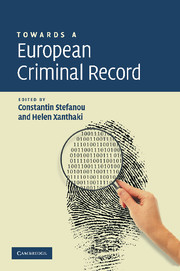Book contents
- Frontmatter
- Contents
- List of contributors
- Preface and acknowledgements
- 1 Introduction: How did the idea of a European Criminal Record come about?
- PART I
- 2 The European Criminal Record: Analysis
- 3 The European Criminal Record: Political parameters
- 4 The establishment of a European Criminal Record: Human rights considerations
- PART II
- PART III
- 19 Conclusions
- Index
2 - The European Criminal Record: Analysis
Published online by Cambridge University Press: 13 July 2009
- Frontmatter
- Contents
- List of contributors
- Preface and acknowledgements
- 1 Introduction: How did the idea of a European Criminal Record come about?
- PART I
- 2 The European Criminal Record: Analysis
- 3 The European Criminal Record: Political parameters
- 4 The establishment of a European Criminal Record: Human rights considerations
- PART II
- PART III
- 19 Conclusions
- Index
Summary
Introduction
The details of the European Criminal Record are crucial for its legitimacy under EU law and for its acceptance by the national legal orders of the Member States. The aim of this chapter is twofold: firstly, to assess the current level of standardisation in the use of criminal records as a national means of combating organised crime; and secondly, to evaluate the conditions under which an ECR could be possible in EU law. In order to achieve these aims the chapter will assess the effectiveness of the current use of national criminal records with particular emphasis on their use and effectiveness in cases of cross-border crime; it will then explore the reception of the ECR in the structure of bodies in the area of justice and home affairs and it will, finally, assess which EU legislative instrument could be used for its introduction and under which conditions this introduction could be attempted.
The current position
Content, use, access and erasure
The end of 1999 saw extensive reviews of national laws on criminal records in a number of Member States, most notably Belgium, Denmark, Greece, the Netherlands, Sweden and the UK mainly as a result of EU law on data protection and the Schengen agreement. Moreover, many of the then candidate countries made extensive amendments to their relevant legislation as a means of complying with EU data protection laws. Examples of this practice can be traced in Cyprus, Hungary and Poland.
- Type
- Chapter
- Information
- Towards a European Criminal Record , pp. 27 - 58Publisher: Cambridge University PressPrint publication year: 2008



